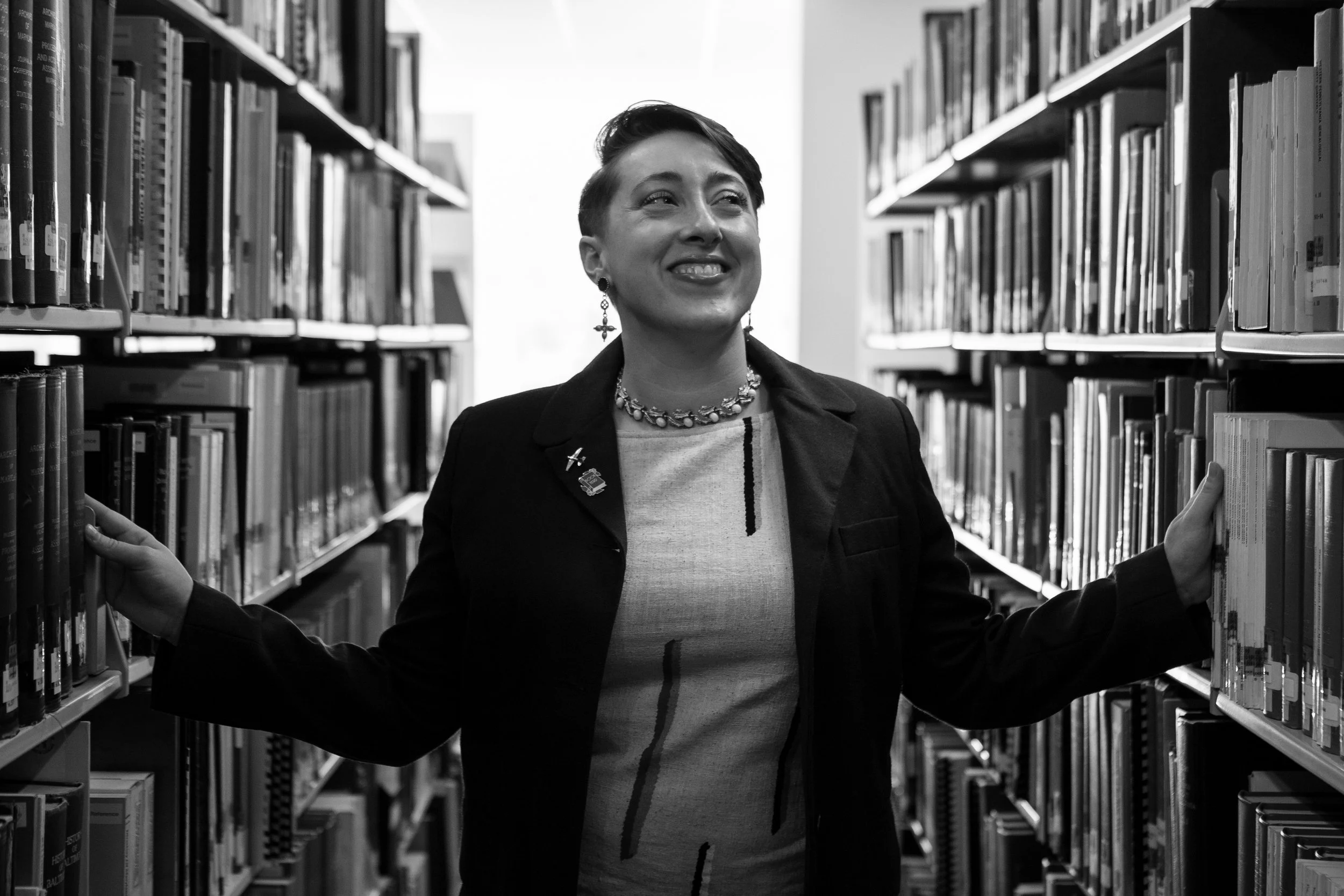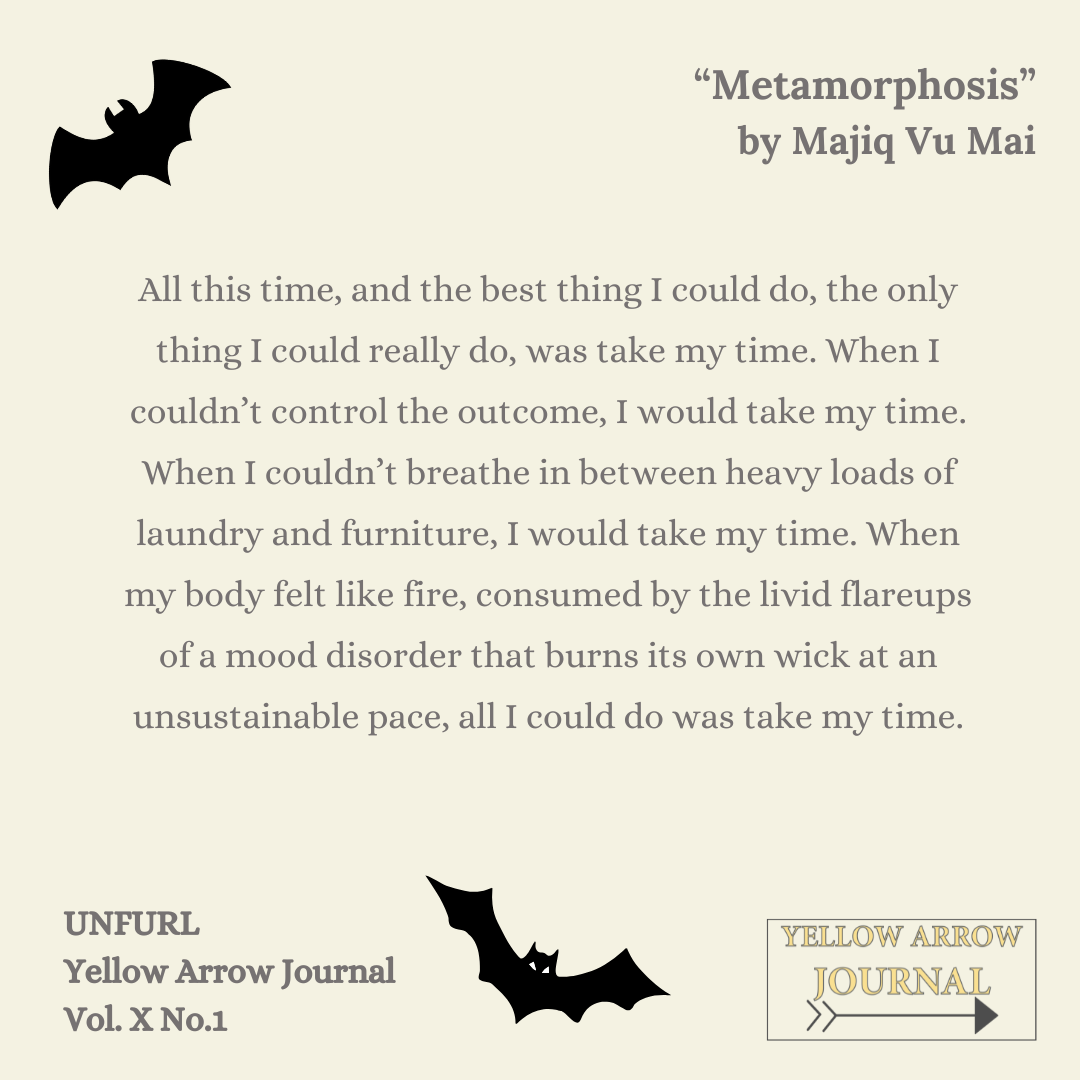
.WRITERS.ON.WRITING..Writers.on.Writing.
Get to know our authors, the foundation and heart of Yellow Arrow Journal, and what writing means to them through our monthly series.
W.o.W. #75
mandy shunnarah
How did you first publish your writing and what was it?
When I was 19, I started writing for my hometown newspaper, The North Jefferson News, in Gardendale, Alabama. I covered a city council meeting where I took meticulous notes on things like stop signs needing to be replaced and deer eating people’s gardens, and turned in 4,000 words of the most boring news writing in the history of journalism. Thankfully, I’ve gotten better since then.
What word do you find yourself using most often in your writing?
I love to throw in “unmoored” when I can. I’m drawn to the idea of not merely being adrift but being set apart in a way that’s confusing and attempting to make sense of your surroundings in relation to your past life. That’s the connotation, at least for me, and it’s a theme in a lot of my work, so “unmoored” makes some nice appearances.
What is a book you wish someone would write?
I want a reverse Indiana Jones swashbuckler! A literary adventure novel full of shipwrecks, museum art heists, and the kind of weird, delightful characters that stick with you for years to come.
What does your inner writing voice tell you?
Whether the idea I want to write needs to be a poem, essay, or short story, I write across all three genres and know pretty quickly which medium the idea would be best served by. I don’t think too hard about it; it’s more running on vibes and intuition.
Mandy Shunnarah (they/them) is an Alabama-born Appalachian and Palestinian-American writer in Columbus, Ohio. Their essays, poetry, and short stories have been published in The New York Times, Electric Literature, The Rumpus, and others. Their first book, Midwest Shreds: Skating Through America’s Heartland, was released in 2024 from Belt Publishing.
Yellow Arrow published Shunnarah’s piece “a train derails in ohio & they still won’t say the name of my country” in Yellow Arrow Journal, Vol. VIII, No. 1, KINDLING. You can find her online on Instagram @offthebeatenshelf, Facebook @Mandy Shunnarah, X @fixedbaroque, and at mandyshunnarah.com.
Mandy would like to share that their poetry collection We Had Mansions is out in the world! You can get your copy at diodeeditions.com/product-page/we-had-mansions. Congratulations Mandy!
.Writers.on.Writing.
Get to know our authors, the foundation and heart of Yellow Arrow Journal, and what writing means to them through our monthly series.
W.o.W. #74
Kalehua kim
Describe an early experience where you learned that language has power.
While taking hula classes as a young child, I felt a great connection to the chants and songs my teacher sang. It helped me find a specific rhythm in my body as I danced. I believe those rhythms are present in my writing as well.
How did you first publish your writing and what was it?
In high school I entered the Young Authors competition where we had to physically bind the stories we submitted. That meant I typed up each page, asked a friend to illustrate it, and then made a cover out of cardboard that my mother helped me cover with fabric and scraps of old shelf paper liner that we assembled around the pages. I don’t remember the name of the story, but there was a mythical element involved. I didn’t win, but it taught me a lot about storytelling and its packaging.
What does your inner writing voice tell you?
Stay open. Listen.
What is essential for good storytelling? What types of stories do you find yourself driving inspiration from and how do they manifest in your work?
I think good storytelling stems from some kind of truth, whether it’s a core value or experience. Having your speaker or character question that truth or work within the complications of that truth can draw in a reader. I like stories that push expectations. What might start as something simple often becomes fraught as the protagonist grapples with it, and then we, too, are confronted with how we might act in a similar situation. I am inspired by characters that question themselves with a true desire to gain greater understanding of themselves and the world. In my work, that usually calls into question how I relate to my culture and upbringing (I am mixed Native Hawaiian and grew up both in Hawai’i and California) as I try to understand the liminal space I exist in as an Indigenous person and woman from mixed cultures living away from my birth land.
Kalehua Kim is a Native Hawaiian poet living in the Pacific Northwest. Her poems have appeared in Poetry Northwest, Denver Quarterly, and ‘Ōiwi, A Native Hawaiian Journal. Her first poetry collection, Mele, will be released on July 1. It can be ordered through Trio House Press at triohousepress.myshopify.com/products/pre-order-mele-by-kalehua-kim.
Yellow Arrow published Kim’s piece “There’s a trick with a pen I’m learning to do” in Yellow Arrow Journal, Vol. X, No. 1, UNFURL. You can find her online on Instagram @kalehuakim, Facebook @kalekim, BlueSky @kalekim.bsky.social, and at kalehuakim.com.
.Writers.on.Writing.
Get to know our authors, the foundation and heart of Yellow Arrow Journal, and what writing means to them through our monthly series.
W.o.W. #73
Majiq Vu Mai
How did you first publish your writing and what was it?
The first piece of writing that I published was a short fiction piece that I wrote in middle school about a young girl who struggles to break free from the chains that other people put on her. I published it by handing out multiple handwritten copies of my story to my classmates in the back of English class.
What is essential for good storytelling? What types of stories do you find yourself driving inspiration from and how do they manifest in your work?
A willingness to be a bad storyteller is essential for good storytelling. Oftentimes, what kills a good piece is the fear that prevents us from writing it. The type of stories I find myself deriving inspiration from the most include protagonists who learn to love themselves through the bitterness of life. I find inspiration in these types of stories because I’m someone who holds a lot of bitterness myself. This inspiration shows up in my writing in how I elicit medicine out of the bitterness of my life, through the alchemizing process of storytelling. Powerful medicine often tastes bitter on the tongue. We swallow it anyway because we trust that swallowing the truth will make us better on the other side.
What word do you find yourself using most often in your writing?
I find myself using the word “possibility” the most in my writing. If I don’t know what word to put down, I put down “possibility” as a placeholder until I could find a better word to use. There are so many possibilities when it comes to using words—maybe we struggle to use them not because we have too few words but because we have too much. But I also think that’s the fun of words, there are an infinite number of arrangements to be made with them.
What does your inner writing voice tell you?
My inner writing voice tells me that my words matter, even when I feel like they don’t. Even if no one reads them. The worst thing that can happen is that I stop writing. How will I know what my heart has to say if I keep everything inside?
Majiq Vu Mai (they/we) is a multiplicity of madness, writing themselves alive with the words they have access to and the words they do not know yet. An alchemist of flesh and memory, Majiq writes whatever burns inside of them like a searing ache and finds relief in giving voice to the truths that no one else wants to hear. For Majiq, memoir is a form of self-constructed fiction—we write to recollect the pieces of ourselves we have lost along the way and remember our possibilities through the creative act of storytelling.
They are currently working on rebuilding the trust that they have with themselves again. They are working on finding the genuine in their voice. They are working on embracing love more than fear. They are working on completing their first collection of essays. They are working on their current reincarnation. They are working on their aliveness.
Yellow Arrow published Majiq’s piece “Metamorphosis” in Yellow Arrow Journal, Vol. X, No. 1, UNFURL. You can find them on Instagram @themajesticmaij.
.Writers.on.Writing.
Get to know our authors, the foundation and heart of Yellow Arrow Journal, and what writing means to them through our monthly series.
W.o.W. #72
Emily Decker
Describe an early experience where you learned that language has power.
I grew up as a preacher’s kid, so from my earliest years, I witnessed the very powerful—and often physical—responses words from the pulpit could elicit within the context of a spiritual practice. It was a formative experience, and although I’m not religious anymore, it did imprint on me an early awareness of the influence of narrative on our beliefs and the chemistry of words and faith.
What word do you find yourself using most often in your writing?
And. It’s probably a byproduct of my theater background, and it’s certainly a word I have to keep an editing eye on. But I love what it does for creating a cadence of continuity and rhythm within a phrase. I also love how it adds more breath and allows for the start a line or phrase in the middle of a thought.
What is a good writing habit you have picked up?
When starting a poem, I usually free-write in a narrative form. Narrative gives me a way into the poem that’s grounding and prevents me from falling into writing that’s too abstract or misses the higher calling of metaphor. I’ve also gotten better at cutting lines I’m attached to but don’t serve the poem—particularly at the ends of my poems. Sometimes, it’s just better to let the poem have its say.
What does your inner writing voice tell you?
Breathe deeper and be in the moment longer.
A former high school teacher turned communications professional, Emily Decker is a Virginia native who spent her childhood in Ghana and her growing-up years in Atlanta, Georgia. She now calls Baltimore home where, in addition to writing, she enjoys dabbling in the community theater scene, singing with the Cathedral Choral Society in D.C., and getting out on the water as much as possible. She holds a master’s degree in secondary education from Georgia State University, and her poetry has appeared in Yellow Arrow Journal, Full Bleed, Hole in the Head Review, 2023’s Bay to Ocean Journal, and Campfire Stories: Chesapeake Bay. Her first chapbook, Homing, will be released by Yellow Arrow Publishing in July 2025.
Yellow Arrow published Emily Decker’s piece “Boxing Day” in Yellow Arrow Journal, Vol. VIII, No. 1, KINDLING. You can find her on Instagram @emadeck. We are excited to release Homing and are enjoying the publication process with Emily.
.Writers.on.Writing.
Get to know our authors, the foundation and heart of Yellow Arrow Journal, and what writing means to them through our monthly series.
W.o.W. #71
Kari Ann Martindale
How did you first publish your writing and what was it?
The first thing I had published was technically a sarcastic editorial I wrote to the local newspaper in high school about Pell Grants for prisoners, though I’ve changed my opinion since then. About the only good thing that came out of it was that I experienced the joy of having someone accept my writing and publish it. Otherwise, I wish I’d never mailed that letter.
What period of your life do you find you write about most often?
I write about 2003 a lot, the time I spent in a war zone in Iraq, which was an unexpected turn in my poetry. And I’m always writing about THE NOW, i.e., current events.
Your most interesting writing quirk?
Unlike many people, I write to silence, with no music or noise in the background.
What does your inner writing voice tell you?
To write even more, and to finish all the poems I’ve started!
Kari Martindale has been published in various literary journals and featured in festivals, ekphrastic events, and literature nights across Maryland. She sits on the Board of Maryland Writers’ Association, helped get EC Poetry & Prose off the ground, and holds an MA in linguistics. Her poem “The List” was a finalist for Line of Advance’s Colonel Darron L. Wright Award. A globetrotter at heart, she’s always planning her next trip. She prioritizes kindness over politeness and justice over peace.
Yellow Arrow published Kari Ann’s piece “Sightseer” in Yellow Arrow Journal, Vol. VII, No. 2, PEREGRINE. You can find her on Instagram @karilogue and her website kariannmartindale.com.









